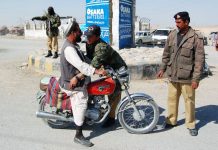BANNU, Pakistan (News Lens Pakistan) — In the wake of a military operation in Pakistan’s western border regions, as many as 100,000 students who fled the area with their families have been out of school for the past six months, sparking concerns they could be vulnerable to recruitment by militants and criminals.
An estimated half-million people have been displaced from North Waziristan in the Federally Administered Tribal Areas along the Afghan border since Pakistan launched a military operation against militants there in June. Most of the 83,000 families have taken refuge in camps and homes in the bordering districts of Bannu, Dera Ismael Khan, Lakki Marwat, and Karak in Khyber Pakhtunkhwa province.
Local leaders fear the displaced students may fall into the hands of outlawed extremist groups.
“I am afraid these young people could easily be misguided by militants or turn to street crime,” Nisar Ali Khan, president of the Committee of North Waziristan Internally Displaced Persons told News Lens Pakistan.
“You cannot ignore such a huge number of young people and leave them unschooled. The issue is very serious, but officials are not very interested in arranging schooling for these displaced youths,” he said.
North Waziristan, a tribal area in Pakistan’s northwest, was a major sanctuary for Taliban and al-Qaida militants, who oppose educating girls and threatened parents who sent their daughters to school.
Taliban commander Hafiz Gul Bahader issued a pamphlet three years ago saying those “seen on the way to schools will be responsible if something unusual happens to them.”
Education in North Waziristan and the rest of the tribal areas suffered greatly under Taliban influence and threats, said Haji Amir Rehman, a retired teacher and former president of the All Teachers Association of North Waziristan.
“As incidents of kidnapping and killing of government officials rose, education officials were restricted to their offices. Teachers, mostly belonging to the local population, became independent and were left to perform their duties without supervision,” Rehman said.
“Thus the education of boys suffered seriously, not to mention that of girls, in an area where most of the people are religiously hardline and girls’ education is considered a futile exercise.”
Government officials claim they have managed to get all displaced students into schools in the areas where they have taken refuge.
“We are in close contact with local education officials. As outlined in government directions, every student is to be admitted to the school where they reside,” Gul Sayed Khan, education officer for North Waziristan said.
Nisar Ali Khan of the Committee of North Waziristan Internally Displaced Persons disagrees.
“You can see thousands of Waziristani students spending their time lining up for rations, driving rickshaws and even using drugs to kill their time,” Khan said.
He estimates about 100,000 students have left North Waziristan due to the military operation, and says about half of them are now attending a new school.
Malik Abdul Samad, president of the Senior English Teachers Association, said North Waziristan’s students have become street children.
“They are highly vulnerable to being recruited and used by criminal gangs,” he said.
He wants the military to provide free admission to all refugee students from North Waziristan to army colleges across Pakistan.
In Bannu and other towns that have absorbed the refugees, youngsters from North Waziristan can be seen standing in long lines at ration stations.
Many of them are driving rickshaws to earn cash for their families.
“I have to pay rent for my house, buy medicine for my ailing parents, pay utility bills and so many other expenses here. How I can go to school?” displaced student Nader Khan asked.
Many of the displaced students move frequently because of rent increases or landlords demanding that the tenants work for them. One student said he had been admitted to a Bannu school but his family moved to another nearby town because of such landlord demands.
“Now I am unable to continue my studies,” he said, adding that he would continue his studies if he went home to North Waziristan.
The government has announced free admission to the schools nearest to the displaced students.
Of the 30 aid organizations in Bannu working with the displaced, only one, Hands, is focused on education for the displaced students. The group has recruited graduates and trained them as teachers for primary students living in camps for the displaced.
“Some students have continued their studies in private institutions, but a great number of the displaced youngsters are still out of school, and if the period of their displacement prolongs, it will surely affect their future,” Ihsanullah Khan, a social worker, said.
“Arrangements should be made on a war footing to restore education to the displaced students,” Khan said. “If we leave these students without education, I think the military operation to get rid of the Taliban and other extremists will fail in its basic aim.”



